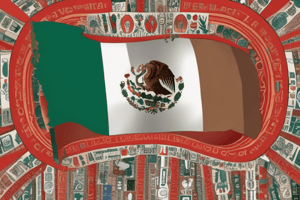Podcast
Questions and Answers
What is the first condition that distinguishes democratic elections?
What is the first condition that distinguishes democratic elections?
Everyone should be able to choose, meaning every person has one vote with equal value.
Why is it important for candidates and parties to offer choices to voters?
Why is it important for candidates and parties to offer choices to voters?
It is important to ensure that there is something meaningful to choose from, allowing voters to express their preferences.
How frequently should elections be held in a democratic system?
How frequently should elections be held in a democratic system?
Elections must be held regularly after every few years.
What outcome is expected from a democratic election in terms of candidate preference?
What outcome is expected from a democratic election in terms of candidate preference?
What does it mean for elections to be conducted in a 'free and fair' manner?
What does it mean for elections to be conducted in a 'free and fair' manner?
Can elections in non-democratic countries truly be called democratic?
Can elections in non-democratic countries truly be called democratic?
What happens if any of the minimum conditions for democratic elections are not fulfilled?
What happens if any of the minimum conditions for democratic elections are not fulfilled?
Why is it crucial to apply the conditions of democratic elections to our own country's elections?
Why is it crucial to apply the conditions of democratic elections to our own country's elections?
Flashcards are hidden until you start studying
Study Notes
Understanding Democratic Elections
- Elections are common in both democratic and non-democratic countries; however, democratic elections possess specific characteristics that set them apart.
- The fundamental principle of democratic elections is universal suffrage, where every individual has one vote with equal weight.
Minimum Conditions for Democratic Elections
- Inclusiveness: All citizens should have the right to vote, ensuring that every vote is equal.
- Real Choices: Voters must have multiple parties and candidates to choose from, allowing for genuine options rather than predetermined outcomes.
- Regular Intervals: Elections should occur systematically, typically every few years, to maintain ongoing representation of the populace.
- True Representation: The preferences of the majority must result in the election of candidates, reflecting the will of the people.
- Fair Process: Elections must be conducted transparently and equitably, enabling individuals to cast their votes freely.
Current Relevance
- Despite these seemingly straightforward conditions, many countries fail to fulfill them, prompting discussions about the nature of their elections.
- An examination of the electoral processes in various nations can help determine if they align with democratic standards.
Studying That Suits You
Use AI to generate personalized quizzes and flashcards to suit your learning preferences.




